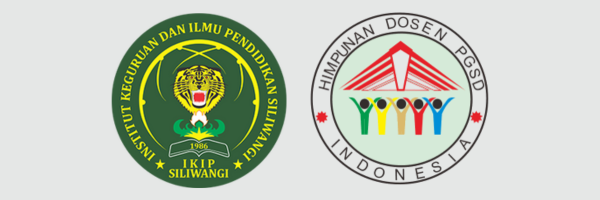PREVENTION OF CORRUPTION BEHAVIOR IN SD CHILDREN THROUGH 7 POE ATIKAN CHARACTER EDUCATION: QUALITATIVE STUDY
DOI:
https://doi.org/10.22460/pej.v5i1.2031Abstract
This research was conducted in general with the aim of analyzing the 7 poe atikan of character education in elementary schools (SD) in an effort to prevent corrupt behavior in elementary school children. The specific purpose of this study was to find out all students who know about corruption in elementary school age children and to know the impact of character education on corrupt behavior among elementary school students. This research was conducted using a qualitative descriptive method with instruments used in the form of questionnaires and interviews. The subjects in this study were 30 students of grade V SDN 8 Ciseureuh Kahuripan Pajajaran. The results of this study indicate that grade V students have seen several activities in daily life including positive and negative attitudes related to corrupt behavior and character education which have a positive impact on students 'understanding related to students' understanding of corrupt behavior and methods. avoid the behavior. The conclusion from this research is that 7 points of character education can have a positive impact in preventing corrupt behavior among elementary school students.
References
Alexander, R., Naylor, B., & Saunders, B. J. (2013). Lawful Correction or Child Abuse: Clarifying the Boundaries, Sanctions and Decision-Making Surrounding the Physical Discipline of Children. SSRN Electronic Journal. https://doi.org/10.2139/ssrn.2322317
Andresen, L., Boud, D., & Cohen, R. (2020). Experience-based learning. In Understanding Adult Education and Training. https://doi.org/10.4324/9781003118299-22
Anyon, Y., Gregory, A., Stone, S., Farrar, J., Jenson, J. M., McQueen, J., … Simmons, J. (2016). Restorative Interventions and School Discipline Sanctions in a Large Urban School District. American Educational Research Journal. https://doi.org/10.3102/0002831216675719
Baumann, C., & Krskova, H. (2016). School discipline, school uniforms and academic performance. International Journal of Educational Management. https://doi.org/10.1108/IJEM-09-2015-0118
Bobby Saragih, J. F., & Tedja, M. (2018). How children create their space for play? IOP Conference Series: Earth and Environmental Science, 109(1). https://doi.org/10.1088/1755-1315/109/1/012045
Buli-Holmberg, J., & Jeyaprathaban, S. (2016). Effective practice in inclusive and special needs education. International Journal of Special Education.
Collins, J. D., McMullen, J. S., & Reutzel, C. R. (2016). Distributive justice, corruption, and entrepreneurial behavior. Small Business Economics. https://doi.org/10.1007/s11187-016-9751-8
Fauzia, N. L. U., & Kelana, J. B. (2020). Natural Science Problem Solving in Elementary School Students Using the Project Based Learning (PjBL) Model. Jurnal Ilmiah Sekolah Dasar, 4(4).
Gershoff, E. T., Grogan-Kaylor, A., Lansford, J. E., Chang, L., Zelli, A., Deater-Deckard, K., & Dodge, K. A. (2010). Parent discipline practices in an international sample: Associations with child behaviors and moderation by perceived normativeness. Child Development. https://doi.org/10.1111/j.1467-8624.2009.01409.x
Gregory, A., Clawson, K., Davis, A., & Gerewitz, J. (2016). The Promise of Restorative Practices to Transform Teacher-Student Relationships and Achieve Equity in School Discipline. Journal of Educational and Psychological Consultation. https://doi.org/10.1080/10474412.2014.929950
Grusec, J. E., Danyliuk, T., Kil, H., & O’Neill, D. (2017). Perspectives on parent discipline and child outcomes. International Journal of Behavioral Development. https://doi.org/10.1177/0165025416681538
Hanemann, U. (2015). Lifelong literacy: Some trends and issues in conceptualising and operationalising literacy from a lifelong learning perspective. International Review of Education. https://doi.org/10.1007/s11159-015-9490-0
Howe, E. R. (2016). Exemplary teacher induction: An international review. In In Search of Subjectivities: An Educational Philosophy and Theory Teacher Education Reader, Volume II. https://doi.org/10.1111/j.1469-5812.2006.00195.x
Hurlock, E. (2014). Perkembangan Anak Edisi Keenam Jilid I. Jakarta. In Penerbit Erlangga.
Izza, L. (2019). MENUMBUHKAN NILAI-NILAI ANTI KORUPSI PADA ANAK UNTUK MEMBENTUK KARAKTER MELALUI “SEMAI GAMES†DI MDTA RABITHATUL ULUM PEKANBARU. Psychopolytan : Jurnal Psikologi.
Izzah, L. (2019). Menumbuhkan Nilai-Nilai Anti Korupsi Pada Anak Untuk Membentuk Karakter Melalui “ Semai Games †Di. 2(2), 84–95.
Kelana, J. B., & Wardani, D. S. (2021). MODEL PEMBELAJARAN IPA SD. Cirebon: Edutrimedia Indonesia.
Kelana, J. J. B., Kelana, J. B., & Pratama, D. F. (2019, December). Improving the Capability of Prospective Primary School Teachers in Making Science-Based Science Teaching Materials Based on ICT Media Assisted Literacy. In 5th International Conference on Education and Technology (ICET 2019) (pp. 1-4). Atlantis Press. Lansford, J. E., & Deater-Deckard, K. (2012). Childrearing discipline and violence in developing countries. Child Development. https://doi.org/10.1111/j.1467-8624.2011.01676.x
Liepa, D., & Å pona, A. (2015). Teaching and Learning in Higher Education. SOCIETY, INTEGRATION, EDUCATION. Proceedings of the International Scientific Conference. https://doi.org/10.17770/sie2014vol1.740
Liu, T., & Wang, H. (2016). The influence of Internet plus the era of bad social ideological trend for college student and the study of countermeasures. https://doi.org/10.2991/amahs-16.2016.89
Mukodi, Burhanuddin, A., & Haryono. (2019). Anti Corruption Perception and Modeling: A Critical Study among Educational Institutions in Pacitan, Indonesia. Journal of Physics: Conference Series. https://doi.org/10.1088/1742-6596/1254/1/012010
Mustofa, & Akhwani. (2019). Strategi Penanaman Nilai-Nilai Antikorupsi di Sekolah Dasar. Education and Human Development Journal, 5(1), 43–60. https://doi.org/10.33086/ehdj.v5i1.1301
Naylor, B., & Saunders, B. (2009). Whose rights? Children, parents and discipline. Alternative Law Journal, 34(2), 80–85. https://doi.org/10.1177/1037969X0903400202
Pea, R., Nass, C., Meheula, L., Rance, M., Kumar, A., Bamford, H., … Zhou, M. (2012). Media use, face-to-face communication, media multitasking, and social well-being among 8- to 12-year-old girls. Developmental Psychology. https://doi.org/10.1037/a0027030
Sakinah, N., & Bakhtiar, N. (2019). Model Pendidikan Anti Korupsi di Sekolah Dasar dalam Mewujudkan Generasi Yang Bersih dan Berintegritas Sejak Dini. El-Ibtidaiy:Journal of Primary Education, 2(1), 39. https://doi.org/10.24014/ejpe.v2i1.7689
Samsudin, A., Kelana, J. B., & Muftianti, A. (2019). Utilization of Internet-Based Learning Media in Enhancing Science Literacy Capabilities of Pgsd Students. PrimaryEdu-Journal of Primary Education, 3(2), 91-96.
Sarmini, Made Swanda, I., & Nadiroh, U. (2018). The importance of anti corruption education teaching materials for the young generation. Journal of Physics: Conference Series. https://doi.org/10.1088/1742-6596/953/1/012167
Smart, J. (2012). Friedrich Froebel. Practical Pre-School. https://doi.org/10.12968/prps.2012.1.133.12
Sutherland, L., & Markauskaite, L. (2012). Examining the role of authenticity in supporting the development of professional identity: An example from teacher education. Higher Education. https://doi.org/10.1007/s10734-012-9522-7
Turner, J. (2018). Individual development. In Psychology for the Classroom. https://doi.org/10.4324/9781315209357-8
Wang, M. Te, & Kenny, S. (2014). Longitudinal Links Between Fathers’ and Mothers’ Harsh Verbal Discipline and Adolescents’ Conduct Problems and Depressive Symptoms. Child Development. https://doi.org/10.1111/cdev.12143












